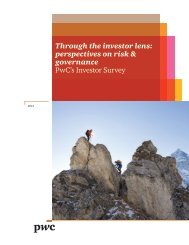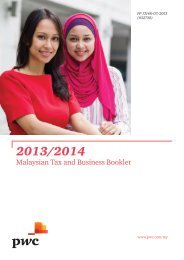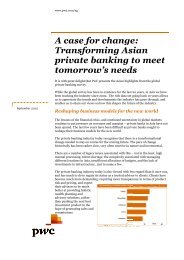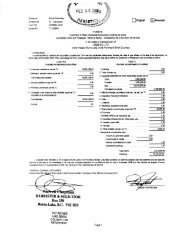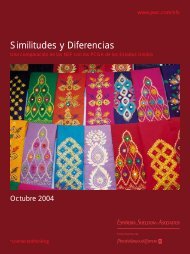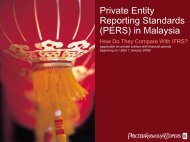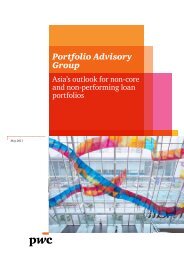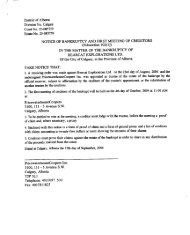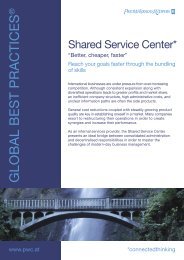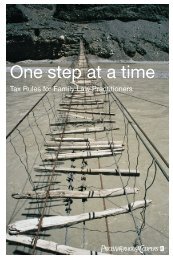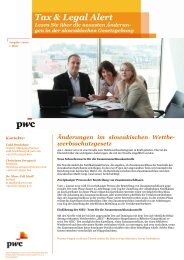TLS Newsletter 11 marzo 2011 - PwC
TLS Newsletter 11 marzo 2011 - PwC
TLS Newsletter 11 marzo 2011 - PwC
Create successful ePaper yourself
Turn your PDF publications into a flip-book with our unique Google optimized e-Paper software.
Nuovo regime fiscale per gli<br />
italiani persone fisiche che<br />
partecipano ad organismi di<br />
investimento collettivo del<br />
risparmio di diritto estero non<br />
armonizzati<br />
(Marco Vozzi)<br />
L’articolo 2, commi da 80 a 83, del D.L. n. 225/2010,<br />
convertito nella Legge n. 10/20<strong>11</strong>, prevede che, dal 1°<br />
luglio 20<strong>11</strong>, gli italiani persone fisiche che partecipano<br />
a certi organismi di investimento collettivo del risparmio<br />
di diritto estero non armonizzati, diversi dai fondi<br />
immobiliari, e situati in determinati Stati membri UE o<br />
dello Spazio Economico Europeo, saranno soggetti ad<br />
un nuovo (e più favorevole) regime fiscale.<br />
In particolare, l’attuale regime tributario fondato sulla<br />
tassazione ordinaria (con applicazione dell’IRPEF ad<br />
aliquote progressive fino al 43%) dei proventi derivanti<br />
dalla partecipazione ad organismi di investimento esteri<br />
non armonizzati sarà abrogato e sostituito da un regime<br />
fiscale improntato su una tassazione definitiva al 12,5%,<br />
a condizione che l’organismo di investimento non armonizzato:<br />
- sia assoggettato a qualche forma di vigilanza nel Paese<br />
estero di costituzione;<br />
e<br />
- sia costituito in un Paese che consente un adeguato<br />
scambio di informazioni con le Autorità fiscali italiane.<br />
Conseguentemente, a partire dalla seconda metà<br />
dell’anno 20<strong>11</strong>, il trattamento tributario applicabile agli<br />
italiani persone fisiche che partecipano ad organismi di<br />
investimento di diritto estero non armonizzati situati in<br />
certi Stati membri UE o dello Spazio Economico Europeo<br />
sarà comparabile a quello attualmente applicabile<br />
agli investitori in organismi di investimento di dritto<br />
estero armonizzati situati in determinati Stati membri<br />
UE o dello Spazio Economico Europeo.<br />
Il nuovo regime si applica ai proventi (redditi di capitale)<br />
percepiti dal 1° luglio 20<strong>11</strong>.<br />
New tax regime for Italian<br />
individual investors in EU and<br />
EEA non-UCITS funds<br />
(Marco Vozzi)<br />
According to Art. 2, par. from 80 to 83, Law Decree no.<br />
225/2010, converted into Law no. 10/20<strong>11</strong>, starting from<br />
next July 1, 20<strong>11</strong>, a new (more favorable) tax regime will<br />
apply to Italian investors (who do not carry on a commercial<br />
activity - e.g.: individuals) in certain EU and EEA<br />
foreign non-UCITS funds (other than real estate funds).<br />
Particularly, the existing regime whereby Italian individual<br />
investors in foreign non-UCITS funds are normally ordinarily<br />
subject to tax (at progressive rates up to 43%) will be<br />
repealed and replaced by a regime whereby a 12.5% final<br />
taxation will apply as long as the non-UCITS fund meet the<br />
following conditions:<br />
- it is subject to the supervision by the regulators in its<br />
Country of organization.<br />
and<br />
- it is organized in a EU Country or in a EEA Country allowing<br />
for an exchange of information procedure with the<br />
Italian Tax Authorities.<br />
As a consequence, starting from mid 20<strong>11</strong>, the tax regime<br />
applicable to Italian individual investors in certain EU and<br />
EEA non-UCITS funds will be comparable to that currently<br />
applicable for investments in EU and EEA UCITS funds.<br />
The new regime will apply to profits qualifying as income<br />
from capital and realized starting from next July 1, 20<strong>11</strong>.<br />
35 <strong>TLS</strong> <strong>Newsletter</strong> n° 3 Anno 20<strong>11</strong>



